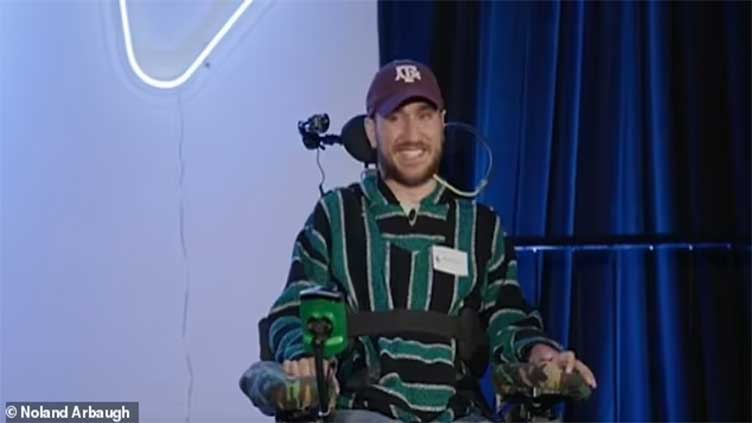Update about first patient who received pioneering brain chip

Technology
Update about first patient who received pioneering brain chip
(Web Desk) - Elon Musk's Neuralink has shared a progress update about the first person to receive a brain chip that allows him to operate a computer and play video games with his mind.
The company announced that it has been more than 100 days since Noland Arbaugh had the device implanted in his brain - and the 29-year-old is still doing.
Arbaugh suffered a life-changing driving accident whilst working as a camp counselor in 2016, which left him with 'absolutely no feeling' from the shoulders down.
His life changed again on January 27 when he underwent a 30-minute procedure that used a 'sewing machine-like' robot to remove a small chunk of his skull and stitch the chip into his brain.
However, Neuralink revealed that some of the threads connected to the chip had retracted weeks after the surgery, resulting in a decrease in the number of effective nodes - but modified the algorithm to boost signal translations.
'Our goal is to provide a high-performance interface that will enhance the control of digital devices for people with quadriplegia, unlocking their personal and professional potential,' Nuerlink share in a blog.
Before receiving Link, Arbaugh could only use a mouth-held tablet stylus to operate a tablet - and his caregiver had to place it in his mouth.
While this was his only form of communication, Arbaugh suffered discomfort, muscle fatigue and pressure sores from holding the stylus.
'The biggest thing with comfort is that I can lie in my bed and use [the Link],' Arbaugh shared in a message he typed on a computer with his mind.
'Any other assistive technology had to have someone else help or have me sit up.
'Sitting causes stress mentally and on my body which would give me pressure sores or spasms.
'It lets me live on my own time, not needing to have someone adjust me, etc. throughout the day.'
In just weeks after the surgery, Arbaugh was able to control his laptop using Link, which he did to play computer games with friends, , browse the internet, live stream and use other applications on his MacBook.
'[The Link] has helped me reconnect with the world, my friends, and my family,' he said.
'It's given me the ability to do things on my own again without needing my family at all hours of the day and night.'
Arbaugh spends the up to eight hours a day contributing to research, but spends more than 10 hours a day on weekends doing personal activities.
Neuralink said that he recently used the device for a total of 69 hours in a single week - 35 hours of structured sessions and an additional 34 hours of personal use.
The company did mentioned that some of the threads attached to the chip had retracted from the brain, but the Neuarlink team modified the recording algorithm to be more sensitive to neural population signals.
This resulted in 'improved the techniques to translate these signals into cursor movements, and enhanced the user interface.'
Nueralink said that it is now focusing on increasing cursor control performance to the same level as that of able-bodied individuals.
'In the future we intend to extend the Link's functionality to the physical world to enable control of robotic arms, While Arbaugh's progress update is hopeful for those who are also paralyzed, the feat has not come without a cost.
DailyMail.com revealed in February that there was horrific animal testing being performed to bring Musk's brain chip project to life.
One week after the billionaire announced the first patient trial was underway, documents revealed that the company used 'Bioglue' to patch up holes in the monkeys' heads after operations.



